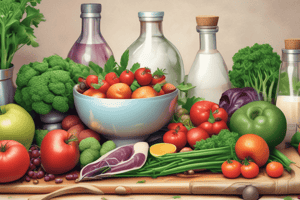Podcast
Questions and Answers
What are the main components of a healthy human diet?
What are the main components of a healthy human diet?
Carbohydrates, lipids, protein, vitamins, minerals, dietary fibre, and water
What is the primary function of carbohydrates in the body?
What is the primary function of carbohydrates in the body?
To provide energy
What is the significance of proteins in the body?
What is the significance of proteins in the body?
For growth and repair of cells and tissues
What is the role of calcium in the body?
What is the role of calcium in the body?
What is the function of fibre in the digestive system?
What is the function of fibre in the digestive system?
What is the consequence of not having a balanced diet?
What is the consequence of not having a balanced diet?
What is the purpose of iodine solution in food testing?
What is the purpose of iodine solution in food testing?
What is the function of Benedict's reagent in food testing?
What is the function of Benedict's reagent in food testing?
What is the role of the digestive system in the body?
What is the role of the digestive system in the body?
What is the path that food takes through the digestive system?
What is the path that food takes through the digestive system?
What is the main difference between mechanical and chemical digestion in the digestive system?
What is the main difference between mechanical and chemical digestion in the digestive system?
What happens to food in the mouth during digestion?
What happens to food in the mouth during digestion?
What is the role of the stomach in the digestive system?
What is the role of the stomach in the digestive system?
What is the function of bile in the digestive system?
What is the function of bile in the digestive system?
What adaptations does the small intestine have to facilitate its function?
What adaptations does the small intestine have to facilitate its function?
What is the role of enzymes in the body?
What is the role of enzymes in the body?
What is the specific function of carbohydrates, lipases, and proteases in digestion?
What is the specific function of carbohydrates, lipases, and proteases in digestion?
What is the lock and key theory, and how does it relate to enzymes?
What is the lock and key theory, and how does it relate to enzymes?
What are two essential minerals that plants require for healthy growth?
What are two essential minerals that plants require for healthy growth?
What happens to plants that are deficient in magnesium?
What happens to plants that are deficient in magnesium?
Flashcards are hidden until you start studying
Study Notes
Diet and Nutrition
- A healthy diet includes carbohydrates, lipids, protein, vitamins, minerals, dietary fiber, and water.
- A balanced diet provides all the necessary nutrients in the right quantities.
- Carbohydrates provide energy and are found in foods like bread, potatoes, rice, and pasta.
- Lipids provide energy and insulation and are found in foods like nuts, dairy products, meat, oils, and sweets.
- Proteins are essential for growth and repair of cells and tissues and are found in foods like eggs, pulses, fish, meat, nuts, and dairy products.
- Vitamins and minerals are crucial for various bodily processes and are found in high quantities in fruit and vegetables.
- Calcium is a mineral that helps build bones and teeth.
- Fiber adds bulk to food and aids digestion, found in foods like fruit, vegetables, and wholegrain cereals.
- Water is essential for transporting substances and facilitating chemical reactions in cells.
Malnutrition and Health Consequences
- Malnutrition occurs when a person lacks a balanced diet.
- Diet imbalances can lead to health consequences like obesity, starvation, and deficiency diseases.
Food Tests
- Iodine solution changes color from brown to black in the presence of starch.
- Benedict's reagent changes color from blue to orange/red when heated in the presence of simple sugars like glucose.
- Biuret reagent changes color from blue to purple in the presence of protein.
The Digestive System
- The digestive system breaks down food molecules into soluble substances for cell absorption.
- Food passes through the mouth, oesophagus, stomach, small intestine, large intestine, and rectum.
- Mechanical digestion involves physical breaking down of food, while chemical digestion involves enzymes and chemicals.
- In the mouth, both mechanical and chemical digestion occur.
- Salivary glands secrete enzymes for chemical digestion.
- The stomach contains acid and performs mechanical and chemical digestion.
The Small Intestine
- Chemical digestion takes place in the small intestine, and small molecules diffuse into the bloodstream.
- The small intestine has villi to increase surface area for nutrient absorption and a good blood supply for absorption into the blood.
Enzymes
- Enzymes speed up chemical reactions in the body.
- Digestive enzymes break down large nutrient molecules into smaller molecules for blood absorption.
- Carbohydrases like amylase break down carbohydrates into simple sugars.
- Lipases break down lipids into glycerol and fatty acids.
- Proteases break down proteins into amino acids.
- The lock and key theory explains enzyme function through specific active sites.
Plant Nutrition
- Plants require minerals for healthy growth, including nitrates for protein production and magnesium for chlorophyll production.
- Plants obtain necessary minerals from the soil through their roots.
- Deficiencies can harm plants, with magnesium deficiency affecting photosynthesis.
Studying That Suits You
Use AI to generate personalized quizzes and flashcards to suit your learning preferences.




